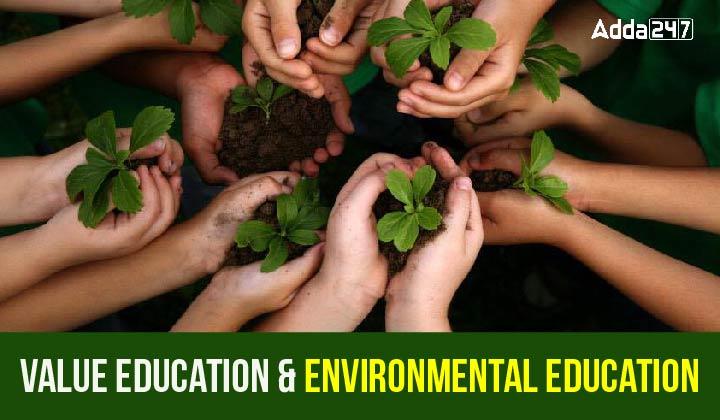Table of Contents
Value Education and Environmental Education are both important topics within the syllabus of the UGC NET (University Grants Commission National Eligibility Test) exam. These subjects are covered in the Education Paper-II of the UGC NET exam, which focuses on various aspects of education.
Candidates preparing for the UGC NET exam can expect questions related to Value Education and Environmental Education, including theoretical concepts, principles, approaches, and their applications in educational settings.
UGC NET Study Notes for Paper 1, Download PDF
What is Value Education?
Value education is the process of imparting moral, ethical, and social values to individuals, alongside their academic education. It aims to develop character, integrity, empathy, and a sense of social responsibility. Through value education, individuals learn to make ethical choices and contribute positively to society, fostering a harmonious and just community.
Need for Value Education
- Value education is essential to cultivate moral and ethical principles in individuals.
- It helps individuals develop a strong character and integrity.
- It instils a sense of social responsibility and encourages active citizenship.
- Value education fosters respect for diversity and promotes harmonious coexistence.
- It equips individuals with the skills to make ethical decisions in their personal and professional life.
- It plays a crucial role in preventing social issues such as corruption, discrimination, and violence.
- It prepares individuals to be responsible leaders and contribute positively to the progress of society.
- Value education creates a foundation for a more just, inclusive, and sustainable future.
Value Education in India
Value education in India holds significant importance due to the country’s diverse cultural and social fabric. It aims to impart moral and ethical values to students alongside academic knowledge. The policies and committees made to encourage value education in India can be seen as follows:
- The National Policy on Education (NPE) 1986 and its revised version in 1992 emphasized the inclusion of value education in the curriculum.
- The National Curriculum Framework (NCF) 2005 stressed the integration of values across various subjects and the need for experiential learning.
- The Central Advisory Board of Education (CABE) has consistently emphasized the importance of value education and its inclusion in schools.
- The National Council of Educational Research and Training (NCERT) has developed textbooks and resources that incorporate value education.
- The Committee on National Policy on Education (1968), the Kothari Commission, highlighted the need for value-based education.
- The National Curriculum Framework for School Education (2020) emphasizes the integration of values, ethics, and life skills in the curriculum.
- The National Education Policy (NEP) 2020 stresses the importance of value education and aims to integrate it into all aspects of education.
What is Environmental Education?
Environmental education is an interdisciplinary field that promotes awareness, knowledge, and understanding of the environment and its interconnectedness with human society. It emphasizes the importance of sustainable practices, the conservation of natural resources, and the protection of ecosystems. Environmental education aims to foster a sense of responsibility and inspire individuals to become environmentally conscious and take action for a more sustainable future.
Need for Environmental Education
- Environmental education is essential to raise awareness about pressing environmental issues, such as climate change, biodiversity loss, and pollution.
- It helps individuals understand the interdependence between human activities and the natural world.
- It promotes a sense of responsibility and encourages individuals to take action towards environmental conservation and protection.
- Environmental education plays a crucial role in fostering a generation of environmentally conscious citizens who can contribute to creating a more sustainable and resilient future.
- It equips individuals with the knowledge and skills to address environmental challenges and find innovative solutions.
- Environmental education instils a sense of stewardship for the Earth and encourages individuals to advocate for sustainable policies and practices at local, national, and global levels.
- Environmental education contributes to building a sustainable society that balances social, economic, and environmental well-being.
Environmental Education in India
- Ministry of Environment, Forest and Climate Change (MoEFCC): Established the Environmental Education, Awareness, and Training (EEAT) scheme.
- Central Board of Secondary Education (CBSE): Made environmental education a compulsory subject in schools.
- National Green Corps (NGC): An initiative by MoEFCC to engage students in environmental activities and education.
- National Council of Educational Research and Training (NCERT): Developed textbooks and resources incorporating environmental education.
- State Council of Educational Research and Training (SCERT): Developed policies and guidelines for state-level environmental education promotion.
- NGOs like the Center for Environment Education (CEE) and World Wide Fund for Nature (WWF): Collaborate with government bodies to promote environmental education.
- National Green Tribunal (NGT): Addresses environmental disputes and enforces environmental laws, indirectly supporting environmental education.
Hence, value and environment education has an important place in the contemporary curriculum. They help learners to be aware of the cultural and social values as well as environmental aspects that need to be taken care of.
Conclusion
By integrating value education and environmental education into the curriculum, we promote sustainable living, empathy, and ethical values. This holistic approach fosters an understanding of the interconnectedness between human values, societal well-being, and environmental health. Together, they pave the way for a more sustainable and equitable future.
Download Value Education and Environmental Education Study Notes PDF
Below is the direct download link for Value Education and Environmental Education Study Notes PDF for UGC NET Exams. Candidates can access and download the Value Education and Environmental Education Study Notes PDF for UGC NET Exams from the provided link.
Download Value Education and Environmental Education Study notes PDF




 UGC NET Commerce Syllabus 2025 PDF Downl...
UGC NET Commerce Syllabus 2025 PDF Downl...
 UGC NET Philosophy Syllabus 2025 PDF Dow...
UGC NET Philosophy Syllabus 2025 PDF Dow...
 PMMMNMTT for NEP 2020, Check details Her...
PMMMNMTT for NEP 2020, Check details Her...














